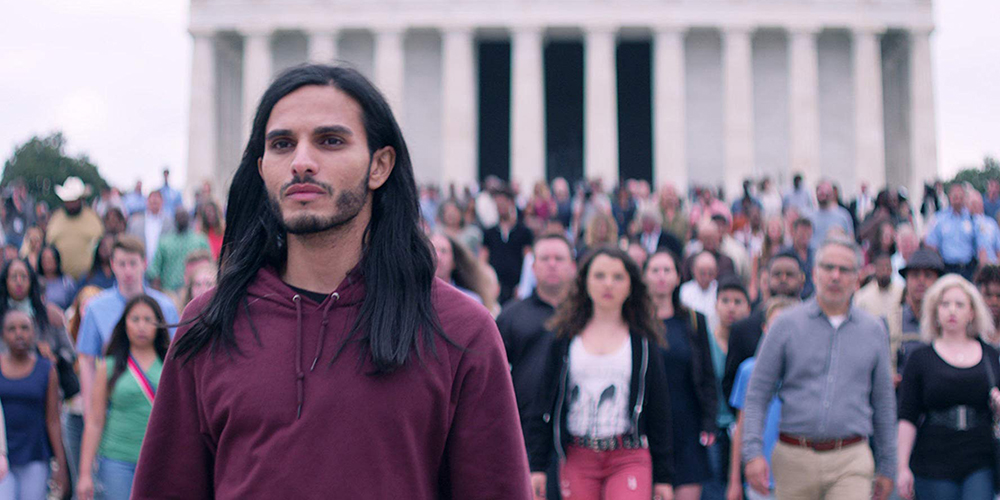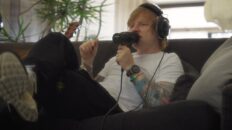As a reminder, my recaps are a little stream of consciousness, as I’m writing while I watch. Sometimes I might posit a theory that’s confirmed or disproven a few sentences later. Sometimes I’m guessing at what’s going on. I also take a “you’re sitting next to me on my couch while I watch” approach. That means you also get all my snarky comments as I watch. It’s part and parcel of watching TV with me.
This episode opens with a return to the Damascus basement where Jibril’s mother was killed. We see her funeral cairn shifting as rocks slowly tumble away. His mother awakens and is bathed in light. She calls out to Jibril, who is half-awake back at the refugee camp. When he looks up, he sees Al-Masih clothed in the same yellow tunic he wore when they first met. Al-Masih leans down to hand him a prayer rug. When Jibril opens it, there is a handgun inside. I’m assuming the whole thing is a vision or dream of some sort, but it’s hard to tell with this show what level of vision it is. Does he actually have a gun now? Is his mother really alive? Did Al-Masih send him that vision?
Back at Yearning Man, the number of pilgrims continues to increase as the police presence swells. Felix is seen frantically trying to wipe off the drying red paint on the side of his church that reads “FALSE GOD” in block letters. Nearby, the camp seems to be dissolving into violence as fights break out. Yearning Man is turning into more of a Fyre Island situation by the day. Nearby, Eva and FBI Man discuss what’s going on. Eva comments that Texas is the perfect place to incite riots, because people are poor, well-armed, and believe in the Bible. Really subtle analysis there from Eva. FBI fires back that there are also a lot of sick and needy people in Texas, but she dismisses that. Eva gets a call from Q telling her that Al-Masih has a name, a real name, Payam Golshiri. Q is in Iran, where rumors emanating from Adar, Payam’s brother, are all over the streets. Q follows up with a yearbook photo confirming it’s Al-Masih that attended Tehran University under the name Golshiri.
In Texas, Masih/Golshiri tells Felix it’s time to go. He doesn’t care where they go, in fact he puts the decision in Felix’s hands, but he says it’s time to go. Felix frantically packs up what is left of their belongings as Anna tries to talk him out of the crazy. She tells him to minister to the people in front of them, what’s left of their town, rather than chasing a dream, but Felix is bought in pretty heavily, and Al-Masih has him drinking the Kool-Aid. Anna relents when Rebecca makes it clear she doesn’t want to stay, and they hop in the church van, which I’m calling the MessiahMobile, to head out of town. Felix, surrounded by a crowd as he gets in the van, tells the crowd, “follow us,” and then takes off. A massive caravan of cars follows in his wake. As they get to the first real fork in the road, Felix has to choose between East and West. He seemingly chooses east when Al-Masih shifts his head from one direction to the other. I wonder at that, because it’s either Felix looking desperately for signs that aren’t there, or Al-Masih is actually really, really good at the power of suggestion. Eastward they go. Eva and FBI Man are in the caravan of hundreds as well. The two of them chat about their expired marriages and FBI Man’s lapsed faith, then he takes a call from a loved one. Eva asks if he has a girlfriend, to which he says “nope,” and then spies a colorful keychain, to which I think we’re all supposed to assume means he’s gay. Well, that answers all the questions they just posed I suppose.
Elsewhere in the caravan, Staci, the woman with the sick child, takes an angry call from her husband, who is furious with her for missing their daughter’s doctor appoints to chase a cult leader. She’s unraveling a bit, unable to really explain why she took their daughter and ran to chase a miracle as her angry and confused husband accuses her of kidnapping and essentially killing their daughter. The subtext here of science vs. religion is pretty clear. The husband has faith that, even if it doesn’t seem like it, the science will win out and cure their daughter. Staci, on the other hand, thinks the science is actually killing her, and they need a miracle. Back in the MessiahMobile, Al-Masih allows Rebecca to Instagram the heck out of him, with some great use of lighting that makes it look like he has a halo. They pointedly pass a sign for Waco, Texas, which only Anna seems to note. The police in Texas hand off the caravan to Arkansas State Police as they make their way across the country. Massive crowds line the streets and highways to praise or protest the caravan.
The caravan bleeds away and we return to the refugee camp where only Jibril and a few others remain. One of the neat things the show does that I’ve commented on before is draw parallels from what seem to be very different situations. As the camera hovers above the camp, we see a smattering of empty tents, just like the tent city at Yearning Man now looks like, as one caravan of cars heads for places unknown, and another on foot heads for safety in Jordan. The camera makes it a little more explicit by showing empty water bottles tumbling along the desert floor and then cuts to water bottles tumbling across the Texas pavement. Back in America, Al-Masih walks by and sees Anna drinking hard liquor out of a brown paper bag but they say nothing to each other. Clearly not everyone is excited to be on a road trip. In her hotel room, Eva bundles up all her fertility treatments and throws them in the garbage, then pulls her wedding ring off and puts it back on again. She’s not ready to let him go yet. Through the window she spies Al-Masih possibly making a call on a payphone, but they can’t figure out where the call went.
In North Carolina, Rebecca Instagrams some more, as they appear to be making their way up the East Coast. Al-Masih compliments Rebecca on her Insta skills and then walks off as she gazes after him. Please, please let this not be a foreshadowing of something between the two of them. Rebecca starts to recognize that Al-Masih is her ticket to Instagram glory. Talk about being an Influencer. The news picks up her Instagram account and they think she’s the official voice of Al-Masih. I guess even New Jesus needs a social media team. The next day, her popularity on Instagram swells even higher as they approach Washington DC. In the back seat of the van, Al-Masih appears to be wordlessly mouthing something to himself. Avi shows up at Eva’s hotel room and basically demands a shower, which, sure, why not? After he cleans up a bit, she tells him they know Golshiri’s name. Tensions rise on the news as the status of the refugee camp on the border becomes an international debacle.
At the camp, Jibril has another vision of his mother offering him an orange. He asks what the taste is, and Al-Masih appears again in her place to answer, “destiny.” Clearly something bigger is happening with Jibril, and the cuts between his mother and Al-Masih could mean a lot of things.
Back in DC, we cut to a university class on Islam, where students begin to scamper out of class with the news that Al-Masih is approaching. On the road, Eva finds out that Golshiri attended class in Massachusetts at the same time as the guy who wrote the terrorist handbook from a couple episodes ago, Wallace. Eva surmises he must have been radicalized there, more than 12 years ago. Cars appear lined up for miles as police presences and road blockades pen the caravan in. The roadblocks dead end them at the Lincoln Memorial. Is Al-Masih going to get out and make an “I Have a Dream” speech? Felix parks the van right there on the street and abandons it, as dozens of people abandon their cars as well to follow. Hundreds descend down the steps of the Lincoln Memorial as Al-Masih approaches the Reflecting Pool. He stands at the edge of the pool and looks at his reflection. As he looks down, we cut to Jibril looking up, and seeing a different Al-Masih, cleaner, in a yellow tunic, reaching his hand down to lift him up. Jibril takes the hand and stands. We cut back to Al-Masih on the Mall.
This show likes its fused scenes, where two storylines happening in parallel are twined together, one speaking while the other moves, and then flipped. It has especially made a habit of doing this in the final minutes of an episode. It looks like the final minutes will be such a scene with Al-Masih paired with Jibril. As Al-Masih preaches about whether the world is good or evil, and tells his followers to look at their neighbors to see themselves reflected there, Jibril begins to take off his clothes. Al-Masih questions the American hold on freedom and justice, asking the people how they, individually, brought freedom or caused justice. He references the Shining City on a Hill (DC) and says “I stand at the gate,” twice. The phrase is referenced in Revelation in the Bible. A few pages after it, as a result of passing through that gate, the four horsemen of the apocalypse are unleashed. He ends by telling them that if they came for something specific, they’ll leave empty-handed, if they come to be found, they’ll be lost. But for everyone else, it’s time for something new. He exhorts them to abandon their scripture, and not to bow down to God anymore. That was then, this is now. They are the chosen people. He will break the mirror that reflects person to person, and they can choose what to do next. That’s interesting to me as it nods towards a debate on free will, so he’s making some arguments that cut right to the core of what the major churches of the world have taught for hundreds of years.
Al-Masih turns to the Reflecting Pool and steps out onto it, walking out onto the water. As he does this, Jibril begins a similar walk across the desert sand, barefoot and naked, toward the Israeli guards. Hundreds of people watch Al-Masih’s walk and look on in stunned silence and tears. Jibril crosses the line and comes face to face with a young Israeli soldier. The barrel of his gun presses to Jibril’s flesh. They stare into each other’s eyes, Israeli to Palestinian, and the gun drops, allowing Jibril to pass. The other refugees follow behind him. Al-Masih walks about halfway out into the Pool and then turns back to the crowd as they all snap away with their cameras.
Wow, what a jam-packed ending to this episode. It’s definitely a hallmark of the show to have a slow build with a giant finish that jumps back and forth between the refugee camp and America. And here they show just how effective it can be at hyping up the power of a big reveal.
Let’s check in on my theories from the first episode:
- He really is the Messiah, the second coming, and God has a message that he’s not pleased, and folks have been misinterpreting his vision for mankind for a couple thousands years, so he sent this dude to correct the record.
What do I think of this theory? Another episode of strong evidence, of course. The whole walking on water thing is a powerful demonstration of his Biblically inspired abilities, assuming it was real. Clearly the people standing right there watching it happen thought it was real. And I have to imagine someone ran up seconds later to look for a platform under the water but didn’t find it. It’s the most overt, public evidence yet supporting his status.
- It’s a government conspiracy / It’s someone else’s conspiracy
The whole thing could be faked of course, but usually the show goes every other episode by leaning into one theory and then providing evidence that it’s wrong. Knowing that Al-Masih is a real person with the name Payam Golshiri doesn’t really disprove anything. He obviously had to come from somewhere. But they dropped other small pieces of information intended to sow doubt among believers in the episode as well given his political and educational history.
- What’s going on with Jibril?
Okay, this isn’t so much a theory as a major question that I think they’ve finally provided enough evidence requires its own section. Al-Masih hasn’t been around since basically the first episode, but we’ve returned to Jibril again and again. He’s gotten help to keep going, he’s seemingly been saved by strong intervention from death at least once, and he’s having visions of angelic figures important to him picking him up and pushing him forward. His innocence is one of his defining features, just as Al-Masih’s judgey intensity is one of his. Clearly Jibril has a future purpose, but I’m not sure that purpose is to be Al-Masih’s follower anymore.
General thoughts so far: They played pretty heavily on Biblical imagery in this episode. I think it’s tucked into every episode, it just isn’t always so obvious. The title of the episode, “We Will Not all Sleep” is a Bible verse followed by “but we will all be changed.” It’s from a series of passages (1 Corinthians 15:51) that describe the Resurrection of Jesus. Clearly, with the walking on water incident, this whole kerfuffle couldn’t help but going from weird cult thing to huge worldwide sensation. I’m really curious to see what happens with Jibril, now that his story seems to be taking up the same level of divine mystery as Al-Masih’s. I’m also kind of waiting for the other shoe to drop. Al-Masih has a sort of dark streak to him, and with every one of these manufactured moments, it looks like he’s sowing the wind. At some point, he’ll want to reap the whirlwind.
Episode grade: A- (I like that things are getting interesting with Jibril, and that they’re making us question not just whether Al-Masih is real or fake, but if he’s good or bad as well).








